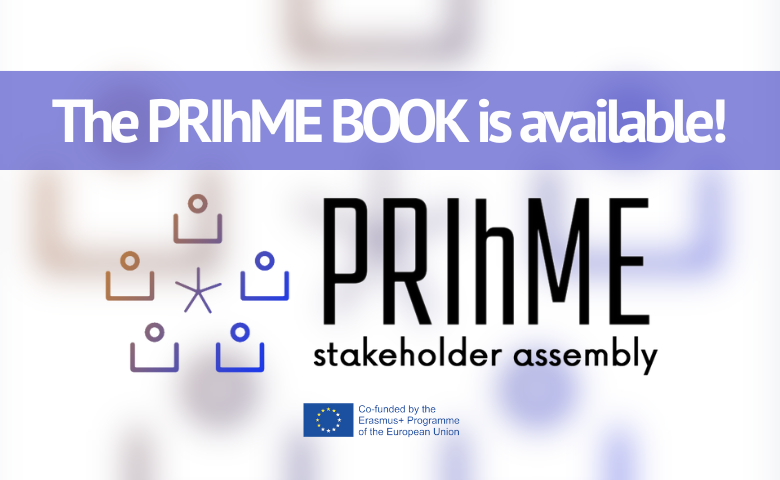The peer-reviewed publication not only explores different aspects of power and how it intersects with factors such as gender, socio-economic background or ableism, but also provides reflections from students, teachers and administrators.
The book is published by Musikene Centro Superior de Música del País Vasco, San Sebastián and edited by the Editorial board of PRIhME, consisting of Christa Brüstle (Universität für Musik und darstellende Kunst Graz), Lucia Di Cecca (Saint Louis Music Center, Rome), Itziar Larrinaga (Musikene Centro Superior de Música del País Vasco, San Sebastián), Mojca Piškor (Academy of Music, Zagreb), Eva Sæther (Malmö Academy of Music), David-Emil Wickström, (Chair, Popakademie Baden-Württemberg, Mannheim).
The chapters of the book follow the thematical topics of the four PRIhME Stakeholder Assemblies, namely Understanding Power Relations & Hierarchies of Power, Gender & Sexism, Socio-Economic Background and Disability, and Artistic Standards.
PRIHME BOOK
The book is meant to be used as a handbook, aimed at diverse readers who want to gain a deeper insight into intricate dynamics of power relations in HME. Although as a whole it attempts to cover several specific aspects contributing to the more nuanced understanding of the complexity of power relations in HME, each of its four parts has been composed so it can function as a standalone part.
Each part of the book consists of four types of texts:
- A short introduction;
- An expert paper (revised and in some cases expanded version of introductory text included in the Brief participants received before each of the Stakeholder Assemblies) introducing the main theme of the respective part, as well as summarising the insights, research, and discourses related to it;
- Three keywords offering an overview of the existing literature on the key concepts relevant to the wider understanding of the main theme of the respective part; and (personal) reflections written by stakeholders (musicians, students, activists, academics, and administrators) studying and working in HMEIs.
Other outcomes of the PRIhME- Power Relations in Higher Music Education project, including the PRIhME recommendations that the Stakeholder assemblies generated and adopted with an overwhelming majority by the AEC general assembly in 2023, as well as the Assembly Briefs, Toolkit, Glossary, Exercises are available on https://aec-music.eu/prihme .
More about PRIhME project:
The 50-person PRIhME Stakeholder Assembles that included students, teachers, and administrative personnel from 9 European partner institutions, were inspired by the citizen’s assembly model and deliberative democracy, in which a small but diverse and representative sample of people affected by a theme makes inclusive recommendations and conclusions for a larger group.
AEC and the partner’s goal was and still is to foster a safe and healthy sector in which we can train and educate creative and socially engaged performing artists through policy recommendations and examples of best practices.
PRIhME partners:
- Royal Irish Academy of Music, Ireland
- Popakademie Baden-Württemberg GmbH, Germany
- Universität für Musik und darstellende Kunst Graz (KUG), Austria
- Musikene Centro Superior de Música del País Vasco/Euskal Herriko Goi Mailako Musika Ikastegia, Spain
- Saint Louis Music Center Srl, Italy
- Academy of Music, University of Zagreb, Croatia
- Akademia Muzyczna im. Krzysztofa Pendereckiego w Krakowie, Poland
- Malmö Academy of Music, Lunds Universitet, Sweden
PRIhME also collaborated with an associate partner:
Kharkiv I. P. Kotlyarevsky National University of Arts, Ukraine






